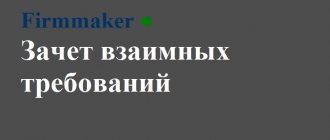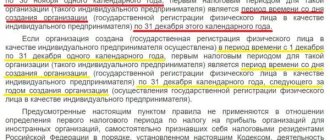1. Taxpayers of value added tax (hereinafter in this chapter - taxpayers) are recognized as:
(as amended by Federal Laws dated December 29, 2000 N 166-FZ
, dated December 1, 2007
N 310-FZ
)
organizations;
individual entrepreneurs;
persons recognized as taxpayers of value added tax (hereinafter in this chapter - tax) in connection with the movement of goods across the customs border of the Customs Union, determined in accordance with customs legislation
Customs Union and
legislation
of the Russian Federation on customs affairs.
(as amended by Federal Laws dated December 29, 2000 N 166-FZ
, dated November 27, 2010
N 306-FZ
)
2. Expired from January 1, 2021. — Federal laws of December 1, 2007 N 310-FZ
, dated July 30, 2010
N 242-FZ
.
3. UEFA (Union of European Football Associations) and subsidiaries of UEFA for the period up to December 31, 2021 inclusive, FIFA (Federation Internationale de Football Association) and subsidiaries of FIFA specified in the Federal Law
dated June 7, 2013 N 108-FZ “On the preparation and holding in the Russian Federation of the 2021 FIFA World Cup, the 2021 FIFA Confederations Cup, the 2021 UEFA European Football Championship and amendments to certain legislative acts of the Russian Federation” (hereinafter — Federal Law “On the preparation and holding in the Russian Federation of the 2018 FIFA World Cup, the 2021 FIFA Confederations Cup, the 2021 UEFA European Football Championship and amendments to certain legislative acts of the Russian Federation”).
(as amended by the Federal Law
dated 05/01/2019 N 101-FZ)
Confederations, national football associations, producers of FIFA media information, suppliers of goods (works, services) to FIFA, defined by the specified Federal Law
and being foreign organizations, in terms of their implementation of operations related to the implementation of activities determined by the specified Federal
Law
.
(clause 3 introduced by Federal Law
dated 06/07/2013 N 108-FZ)
Who pays VAT when selling goods, works or services in the Russian Federation?
Activities for the sale of goods, works and services in Russia are considered subject to value added tax. Organizations and individual entrepreneurs are VAT taxpayers in Russia. When carrying out actions to sell goods, services or work, entrepreneurs and organizations pay VAT in the manner established by the Tax Code of the Russian Federation. Exceptions are specified in paragraph 2 of Article 146 and Article 149 of the Tax Code of the Russian Federation. But these exceptions do not concern the taxpayers themselves, but the actions performed by them. All transactions listed in the specified articles are not subject to tax. This does not depend on who exactly commits them. At the same time, the Tax Code also contains a procedure for exempting organizations and entrepreneurs from their obligations as VAT payers (Article 145 of the Tax Code of the Russian Federation). It is applied depending on the amount of revenue of the organization or entrepreneur for the goods sold (work or services). Companies that use special tax regimes do not pay VAT: simplified tax system, UTII, unified agricultural tax.
Article 143 of the Tax Code of the Russian Federation. Taxpayers (current version)
According to paragraph 4 of paragraph 2 of Article 11 of the Tax Code of the Russian Federation, for tax purposes, individual entrepreneurs include individuals registered in the prescribed manner and carrying out entrepreneurial activities without forming a legal entity, heads of peasant (farm) farms. Individuals carrying out entrepreneurial activities without forming a legal entity, but who have not registered as individual entrepreneurs in violation of the requirements of the civil legislation of the Russian Federation, when performing the duties assigned to them by the Tax Code of the Russian Federation, do not have the right to refer to the fact that they are not individual entrepreneurs.
In accordance with paragraph 1 of Article 23 of the Civil Code of the Russian Federation, a citizen has the right to engage in entrepreneurial activity without forming a legal entity from the moment of state registration as an individual entrepreneur. Article 2 of the Civil Code of the Russian Federation provides that entrepreneurial activity is an independent activity carried out at one’s own risk, aimed at systematically obtaining profit from the use of property, sale of goods, performance of work or provision of services by persons registered in this capacity in the manner prescribed by law.
According to paragraph 4 of Article 23 of the Civil Code of the Russian Federation, a citizen who carries out entrepreneurial activities without forming a legal entity in violation of the requirements of paragraph 1 of Article 23 of the Civil Code of the Russian Federation does not have the right to refer to the transactions concluded by him to the fact that he is not an entrepreneur. The court may apply to such transactions the rules of the Tax Code of the Russian Federation on obligations associated with carrying out business activities.
Thus, an individual carrying out entrepreneurial activities, in the absence of registration as an individual entrepreneur, does not have the right to refer to the fact that he is not an individual entrepreneur.
Official position.
Thus, the letter of the Ministry of Finance of Russia dated December 29, 2014 N 03-11-11/68030 explains that the sale of non-residential premises by individual entrepreneurs recognized as taxpayers of value added tax is subject to taxation with this tax in the generally established manner.
If the non-residential premises were not used for business activities carried out by an individual as an individual entrepreneur, then upon its sale value added tax is not calculated, since, on the basis of Article 143 of the Tax Code of the Russian Federation, individuals when selling goods (works, services) within the framework of non-entrepreneurial activities are not recognized as taxpayers of this tax.
An example from judicial practice.
When carrying out activities outside the framework of entrepreneurial activity by an individual who has the status of an individual entrepreneur, such sales are not subject to VAT. Thus, in the Resolution of January 12, 2010 N F09-5369/09-S2, the Federal Antimonopoly Service of the Ural District supported the conclusion of the appellate court that the status of an individual entrepreneur cannot change the status of real estate belonging to him as an individual, determined by civil law, even if such the property is leased by the owner as an individual entrepreneur.
According to the circumstances of the case, an individual entrepreneur uses his property not only to engage in entrepreneurial activities, but also as personal property necessary for personal needs, therefore his property cannot be delimited.
Consequently, when an individual, although having the status of an individual entrepreneur, sells goods (work, services), but outside the framework of entrepreneurial activity, such sales cannot be recognized as subject to VAT taxation, which corresponds to the position of the financial department, according to which what is sold by an entrepreneur non-residential (residential) premises cannot be classified as fixed assets of an individual entrepreneur, since they are not used directly as means of labor in the process of carrying out business activities.
Let's consider an example from judicial practice, where the court came to the opposite position, based on the case materials, recognizing the entrepreneur as a VAT payer.
Thus, the Resolution of the Seventh Arbitration Court of Appeal dated 06/04/2014 N A67-5694/2013 states that citizens carrying out business activities without state registration as individual entrepreneurs are taxpayers in accordance with the norms of tax legislation. In accordance with the civil legislation of the Russian Federation, entrepreneurial activity includes activities that have the characteristics specified in Article 2 of the Civil Code of the Russian Federation and are carried out by a person who does not have the status of an individual entrepreneur.
The premises leased by an entrepreneur are not intended for use for personal purposes not related to business activities. The purpose of renting out premises was to make a profit.
Based on the provisions of the above norms, organizations and individual entrepreneurs that meet the criteria of Article 11 of the Tax Code of the Russian Federation are VAT payers. However, it should be remembered that not everyone.
Attention!
Here it is necessary to take into account that paragraph 7 of Article 12 of the Tax Code of the Russian Federation determines that the Tax Code of the Russian Federation establishes special tax regimes that may provide for federal taxes not specified in Article 13 of the Tax Code of the Russian Federation, determines the procedure for establishing such taxes, as well as the procedure for the implementation and application of these special tax regimes.
The list of special tax regimes is enshrined in Article 18 of the Tax Code of the Russian Federation. Special tax regimes based on Article 18 of the Tax Code of the Russian Federation include: a taxation system for agricultural producers (single agricultural tax), a simplified taxation system, a taxation system in the form of a single tax on imputed income for certain types of activities, a taxation system for the implementation of production sharing agreements, as well as the patent taxation system (Chapter 26.5 “Patent taxation system” of the Tax Code of the Russian Federation was introduced by Federal Law dated June 25, 2012 N 94-FZ, in turn, a new special tax regime is applied by individual entrepreneurs from January 1, 2013).
According to the second paragraph of paragraph 7 of Article 12 of the Tax Code of the Russian Federation, special tax regimes may provide for exemption from the obligation to pay certain federal, regional and local taxes and fees specified in Articles 13 - 15 of the Tax Code of the Russian Federation.
This provision also applies to the obligation of taxpayers applying a special tax regime to pay VAT, for example:
1) paragraph 3 of Article 346.1 of the Tax Code of the Russian Federation establishes that organizations and individual entrepreneurs who are taxpayers of the unified agricultural tax are not recognized as taxpayers of value added tax (with the exception of value added tax payable in accordance with the Tax Code of the Russian Federation when importing goods into the territory of the Russian Federation). Federation and other territories under its jurisdiction, as well as value added tax paid in accordance with Article 174.1 of the Tax Code of the Russian Federation);
2) paragraph 2 of Article 346.11 of the Tax Code of the Russian Federation establishes that organizations applying the simplified taxation system are not recognized as taxpayers of value added tax, with the exception of value added tax payable in accordance with the Tax Code of the Russian Federation when importing goods into the territory of the Russian Federation and other territories , under its jurisdiction, as well as value added tax paid in accordance with Article 174.1 of the Tax Code of the Russian Federation.
The provisions of paragraph 3 of Article 346.11 of the Tax Code of the Russian Federation contain provisions similar to the above in relation to individual entrepreneurs using a simplified taxation system;
3) paragraph 4 of Article 346.26 of the Tax Code of the Russian Federation provides that organizations and individual entrepreneurs who are taxpayers of the single tax on imputed income are not recognized as taxpayers of value added tax (in relation to transactions recognized as objects of taxation in accordance with Chapter 21 of the Tax Code of the Russian Federation, carried out within the framework of entrepreneurial activity subject to a single tax), with the exception of value added tax payable in accordance with the Tax Code of the Russian Federation when importing goods into the territory of the Russian Federation and other territories under its jurisdiction;
4) paragraph 11 of Article 346.43 of the Tax Code of the Russian Federation provides that individual entrepreneurs applying the patent tax system are not recognized as taxpayers of value added tax, with the exception of value added tax payable in accordance with the Tax Code of the Russian Federation when carrying out types of business activities in respect of which the patent tax system is not applied; when importing goods into the territory of the Russian Federation and other territories under its jurisdiction; when carrying out transactions taxed in accordance with Article 174.1 of the Tax Code of the Russian Federation.
Based on the letter of the Ministry of Finance of Russia dated May 16, 2011 N 03-07-11/126, commission agents (agents), including organizations and individual entrepreneurs using a simplified taxation system that sell goods (works, services) from your name.
In other cases, taxpayers using the simplified taxation system do not have to issue invoices.
This rule can be automatically extended to other special tax regimes.
In a situation where “special regime agents” sell goods (work, services) through an intermediary, he does not calculate value added tax and does not issue invoices. This conclusion follows from the letter of the Ministry of Finance of Russia dated May 31, 2011 N 03-07-11/152, which notes that an agent who sells on its own behalf the services of a principal applying the unified agricultural tax does not calculate value added tax on such services and does not issue corresponding invoices.
Please note that the approach of the official bodies to this issue has not changed today; they adhere to the same position.
Attention!
It should be noted that not only persons applying special tax regimes are not VAT payers. VAT is also not paid by persons exempt from fulfilling the duties of a VAT taxpayer in accordance with Article 145 of the Tax Code of the Russian Federation.
Current problem.
Clause 5 of Article 173 of the Tax Code of the Russian Federation establishes that the amount of tax payable to the budget is calculated by the following persons if they issue an invoice to the buyer highlighting the amount of tax:
1) persons who are not taxpayers, or taxpayers exempt from fulfilling taxpayer obligations related to the calculation and payment of tax;
2) by taxpayers when selling goods (work, services), operations for the sale of which are not subject to taxation.
The Financial Department has repeatedly emphasized that paragraph 5 of Article 173 of the Tax Code of the Russian Federation is the only case when organizations using the simplified taxation system issue invoices highlighting the amount of value added tax and pay it to the budget (see letters from the Ministry of Finance of Russia dated July 18, 2013 N 03-07-11/28306, dated 04/05/2013 N 03-07-11/11247). Similar clarifications have been formulated in relation to the remaining “special regimes” (see, for example, letter of the Federal Tax Service of Russia dated January 17, 2013 N ED-2-3 / [email protected] ).
In letters dated 08/07/2013 N 03-11-11/31784, dated 07/05/2013 N 03-07-14/26067, the Ministry of Finance of Russia draws attention to the fact that when applying this norm in relation to UTII payers, it should be taken into account that, according to paragraph 1 of Article 346.28 Under the Tax Code of the Russian Federation, organizations and individual entrepreneurs switch to paying a single tax on imputed income voluntarily.
Deregistration of this tax by a taxpayer upon termination of business activities subject to single tax on imputed income, transition to another taxation regime, including on the grounds established by subparagraphs 1 and 2 of paragraph 2.2 of Article 346.26 of the Tax Code of the Russian Federation, is carried out on the basis of an application submitted to the tax authority within five days from the date of termination of business activity subject to a single tax on imputed income, or from the date of transition to a different taxation regime, or from the last day of the month of the tax period in which violations of the requirements established by subparagraphs 1 and 2 of paragraph 2.2 were committed Article 346.26 of the Tax Code of the Russian Federation (clause 3 of Article 346.28 of the Tax Code of the Russian Federation).
Thus, the Tax Code of the Russian Federation does not contain such grounds for the loss of the right to apply the taxation system in the form of a single tax on imputed income for certain types of activities, such as the issuance of an invoice by the payer of a single tax on imputed income.
Attention!
Another category of value added tax taxpayers are persons who move goods across the customs border of the Customs Union, determined in accordance with the customs legislation of the Customs Union and the legislation of the Russian Federation on customs affairs.
In accordance with Article 79 of the Customs Code of the Customs Union, payers of customs duties and taxes are the declarant or other persons who, in accordance with the Customs Code of the Customs Union, international treaties of the member states of the Customs Union and (or) the legislation of the member states of the Customs Union, are charged with payment of customs duties and taxes.
According to Article 114 of the Federal Law of November 27, 2010 N 311-FZ “On Customs Regulation in the Russian Federation” (hereinafter referred to as Law N 311-FZ), payers of customs duties and taxes are the declarant or other persons who are responsible for paying customs duties, taxes in accordance with the Customs Code of the Customs Union, international treaties of the member states of the Customs Union and Law N 311-FZ.
Based on Article 186 of the Customs Code of the Customs Union, declarants may be:
1) a person of a member state of the Customs Union:
who has concluded a foreign economic transaction or on whose behalf (on behalf of) this transaction was concluded;
having the right to own, use and (or) dispose of goods - in the absence of a foreign economic transaction;
2) foreign persons:
an individual moving goods for personal use;
a person enjoying customs benefits in accordance with Chapter 45 of the Customs Code;
an organization that has a representative office established on the territory of a member state of the Customs Union in the prescribed manner - when applying for customs procedures for temporary import, re-export, as well as customs procedures for release for domestic consumption only in relation to goods imported for the own needs of such representative offices;
a person who has the right to dispose of goods not within the framework of a transaction, one of the parties to which is a person from a member state of the Customs Union;
3) for the application of the customs procedure for customs transit - the persons specified in subparagraphs 1 and 2 of this article, as well as:
carrier, including customs carrier;
freight forwarder, if he is a person of a member state of the Customs Union.
Current problem.
From the literal interpretation of paragraph 1 of Article 143 of the Tax Code of the Russian Federation it follows that public legal entities are not VAT payers, since they are not named as such.
However, paragraph 1 of the Resolution of the Plenum of the Supreme Arbitration Court of the Russian Federation dated May 30, 2014 N 33 “On some issues arising in arbitration courts when considering cases related to the collection of value added tax” states that Article 143 of the Tax Code of the Russian Federation does not name public legal entities as value added tax payers.
At the same time, state (municipal) bodies that have the status of a legal entity (state or municipal institutions), by virtue of paragraph 1 of Article 143 of the Tax Code of the Russian Federation, can be tax payers for financial and economic transactions performed by them, if they act in their own interests as independent economic entities subjects, and do not implement the public legal functions of the corresponding public legal entity and do not act on its behalf in civil legal relations in the manner prescribed by Article 125 of the Civil Code of the Russian Federation.
Thus, we see that public legal entities, under certain conditions, also act as VAT taxpayers.
Attention!
The provisions of paragraph 2 of Article 143 of the Tax Code of the Russian Federation in accordance with paragraph 6 of Article 12 of the Federal Law of July 30, 2010 N 242-FZ apply until January 1, 2021.
Paragraph 3 of the commented article was introduced by Federal Law dated 06/07/2013 N 108-FZ “On the preparation and holding in the Russian Federation of the 2021 FIFA World Cup, the 2021 FIFA Confederations Cup and amendments to certain legislative acts of the Russian Federation.”
The need to introduce this norm is due to the holding of the 2021 FIFA World Cup and the 2017 FIFA Confederations Cup.
Official position.
Thus, in the letter of the Ministry of Finance of Russia dated January 22, 2015 N 03-07-07/1643, it is explained that paragraph 3 of Article 143 of the Tax Code of the Russian Federation establishes a preferential tax regime for organizations whose activities are related to the preparation and holding of the 2021 FIFA World Cup in the Russian Federation , FIFA Confederations Cup 2021.
The preferential taxation procedure for these organizations is established by the norms of paragraph 3 of Article 143, subparagraph 13 of paragraph 2 of Article 146 of Chapter 21 “Value Added Tax”, paragraph 4 of Article 246, subparagraph 45 of paragraph 1 of Article 251, paragraph 48.16 of Article 270 of Chapter 25 “Corporate Income Tax” ”, as well as paragraph 1.2 of Article 373 of Chapter 30 “Property Tax of Organizations” of the Tax Code of the Russian Federation. At the same time, these norms do not establish a list of documents confirming the legality of applying preferential taxation procedures.
Thus, the basis for applying a preferential taxation procedure may be documents confirming the status of these organizations, agreements and contracts concluded with FIFA or its authorized persons for the implementation of activities provided for by Federal Law of June 7, 2013 N 108-FZ “On the preparation and holding the 2021 FIFA World Cup, the 2021 FIFA Confederations Cup in the Russian Federation and introducing amendments to certain legislative acts of the Russian Federation,” documents confirming the fact of payment by FIFA or other persons authorized by it for purchased goods (work performed, services provided), and so on.
A similar position was also expressed in the letter of the Ministry of Finance of Russia dated January 15, 2015 N 03-02-07/1/421.
Are non-profit organizations payers of VAT?
According to Article 143 of the Tax Code of the Russian Federation, VAT payers are:
- organizations;
- entrepreneurs;
- persons involved in the movement of goods across the border of the Customs Union.
The code does not contain any separate clauses regarding non-profit organizations. Since all organizations are recognized as taxpayers, non-profit organizations are included among them by default. There is no judicial practice concerning this topic, and this indicates that such a statement does not cause controversy. In addition, the Ministry of Finance expressed the position that autonomous institutions, when performing work and providing services, must pay VAT to the budget, which confirms the conclusion that non-profit organizations are VAT payers.






